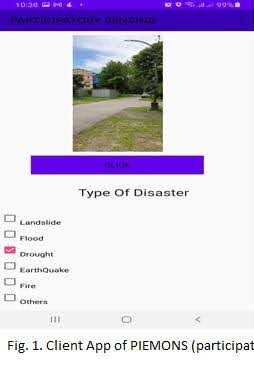While sparsely-populated hilly or mountainous regions provide the luxury of a natural environment sans air or noise pollution, it is a challenge to live alongside the natural calamities that are inherent to these regions. The rainy season brings in the inevitable landslides and flash-floods. On the other hand, forest fires and fire accidents commonly occur during the wintry dry season. Prevention of these calamities may require research in some areas such as road-building, etc. However, the issue is that in the event of such a calamity, early dissemination of information about such an event is vital for faster response and recovery. For instance, a long-distance traveller may not know that a landslide blocking the road that she is to take has occurred even one hour before she started her journey. Hence, she may commence her journey only to turn back (if she is fortunate enough to meet somebody with the information), incurring wastage of time and resource. In a nutshell, it would be great to have an information gathering-processing system which would provide up-to-date information about public interest events such as a roadblock due to landslide.
Deployment of sensing infrastructure such as a sensor network or sensing devices at specialized locations in far-flung remote mountainous regions is next to impossible due to the geography of the region. Even if it were possible, deploying and maintaining them would be extremely costly. Thus, this research leverages the ubiquitous nature of mobile devices which people always carry around and builds a Mobile Crowd Sensing (MCS) system. A prototype mobile application was thus developed by the team comprising of N. Marchang and her students. Data sensed by mobile devices are uploaded to a cloud server and the data consolidated at the server is analysed for meaningful inference
Apart from developing the above prototype, the following are the new techniques developed by the team:
a) The team developed a novel technique for missing data inference in MCS. This technique exploits the spatio-temporal correlation between sensed data for missing data inference using the Nearest Neighbours concept. This work was published in IEEE Sensors “KNN-ST: Exploiting Spatio-Temporal Correlation for Missing Data Inference in environmental Crowd Sensing,” IEEE Sensors Journal, vol. 21, no. 3, pp: 3429-3436, February 1, 2021.
b) Another new technique for missing data inference was developed using Machine Learning (ML). This work is reported in Springer: “Task Reduction using Regression-based Missing Data Imputation in Sparse Mobile Crowdsensing”, vol. 78, 15995–16028 (2022), Journal of Supercomputing.
c) Provisioning user privacy is another challenging issue in MCS. Adversaries should not be able to infer private information (e.g., home location) of a user from the data contributed by her to the MCS system. This problem has been tackled by the team using the perceptual hash concept. This work is reported in IOS: “PAMDI: Privacy Aware Missing Data Inference Scheme for Sparse Mobile Crowd Sensing Journal of Ambient Intelligence and Smart Environments” Journal of Ambient Intelligence and Smart Environments (IOS), Vol.15, No.1, 2023 pp 19–46.
d) Allocation of sensing tasks to participants in the MCS campaign in such a way that the effort put in by the participants is optimal is another problem that the team has solved using some techniques based on the ‘Greedy’ strategy. This work is published in Springer: Meitei, M. G. and Marchang, N., “Altruistic User-Oriented Task Allocation Techniques for Mobile Crowdsensing”, CCF Transactions on High Performance Computing (Springer). Another work on task allocation has been recently accepted for publication in Springer: “Provisioning Load Balancing in Time-Sensitive Task Allocation for Mobile Crowdsensing”, Accepted for publication in Journal of Network and Systems Management (Springer).
Several other parts of the research are presented in conferences too and some are in the publication process. Currently, the team is continuing its work in MCS.
